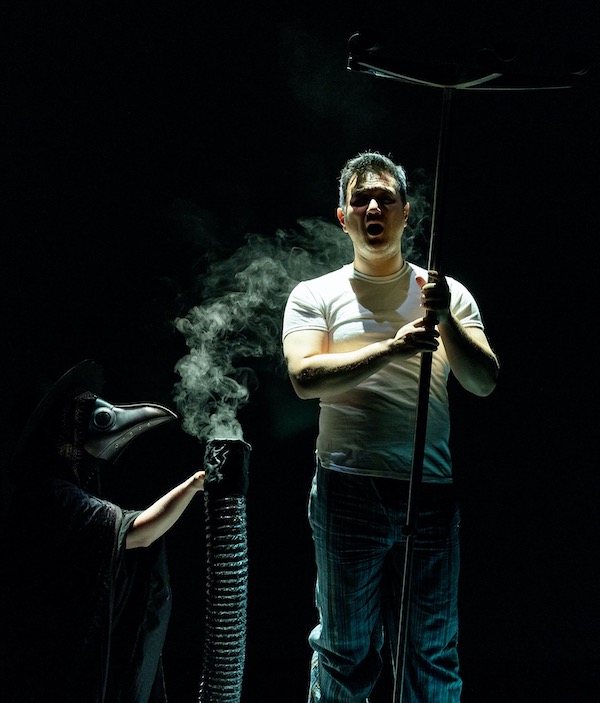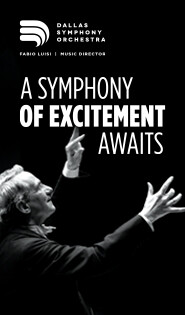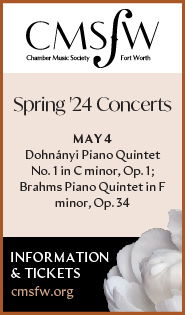Mercury’s staged “Winterreise” too often leaves Schubert out in the cold

Houston’s Mercury period-instrument orchestra stages one theatrical production each season, and this year’s offering put the tragic protagonist of Franz Schubert’s Winterreise into a mental institution.
At the start of Saturday’s performance–staged by Mercury artistic director Antoine Plante and brother Denis Plante, who jointly orchestrated Schubert’s songs for 12 strings–the setting was more abstract. The Cullen Theater’s stage was a stark dreamscape dominated by a few plank walkways, two stark sculptures suggesting deer and a miniature house.
Nicholas Phan entered garbed in fur-lined coat and hat. During the opening song, “Gute Nacht,” the tenor knelt alongside actor Kaitlin Kennedy, who played the hero’s sleeping sweetheart–one of several mute figures Kennedy portrayed. While that fitted the song’s text, a nighttime goodbye, the staging soon flirted with the ludicrous.
At the start of “Die Wetterfahne,” which compares the sweetheart’s affections to a weathervane fluttering in the wind, Kennedy stood, and Phan extended her arm like a weathervane’s pointer. As he sang, she periodically twisted, aiming herself in new directions.
Phan then sat down at a typewriter and clacked the keys in time with the staccato introduction of “Gefror’ne Tränen,” a song describing tears of heartbreak: Anguish was spurring creativity, apparently. At the end of “Die Post,” which closed the de facto Act 1, papers presumably pulled from the typewriter fluttered down from above the stage.
The beginning of the second act finally established the setting. A combination of computer image and actual chairs conjured up a hospital waiting room, and Phan clutched a rolling intravenous stand–which held, not glucose bags, but some of those papers.
As Phan sang “Das Wirtshaus,” a vision of the waiting cemetery, Kennedy–now a hospital attendant–slowly pushed a wheelchair back and forth across the stage behind him. Phan sat in it, reuniting with the typewriter waiting on the seat. But in the final “Der Leiermann,” Phan was back on his feet, holding his IV stand upside-down and slowly rotating it–like the song’s beggar cranking his hurdy-gurdy.
If all this added up to a parable of madness generating poetry, did it shed any fresh light on Schubert’s classic portrait of heartache and loneliness? Not at all.
Even though the lighting left Phan’s face often in shadow–and his eyes almost always so–he brought Schubert’s music a rueful intensity.
Phan’s voice ranged from hushed and still during the suffering youth’s introspections to pungently forceful during the outcries. He sang with a declamatory bent that had tinges of Schoenbergian sprechgesang–approximate in terms of pitch and line, but pointed and vigorous in its impact.
Subtlety figured in less, though, so Schubert’s emotional shadings sometimes fell by the wayside.
When lyricism blossomed, as in the famous main melody of “Der Lindenbaum,” Phan sketched it in so lightly–even faintly at times–that the notes hardly connected into phrases. The absence of those moments of warmth and sweetness robbed the music of a vital ingredient: the counterpoint to all the starkness.
Nor did Phan command the hale-and-hearty gusto to flesh out “Mut!”–the protagonist’s eleventh-hour attempt at bravado.
In the songs’ lower-lying passages, Phan was barely audible. And his quasi-spoken singing style gradually became a case of diminishing returns. Phan’s sotto voce “Der Leiermann” might have been powerful at the end of a more multifaceted performance; instead, the tone had become familiar.
While the Plantes’ orchestration included a few effective strokes, it didn’t match the color and impact that an accomplished pianist can bring Schubert’s score.
The murmuring tremolos that opened “Der Lindenbaum” may have suggested rustling leaves even more effectively than the piano swirls of Schubert’s original. In “Der Leiermann,” the solo violin made the spare little treble phrases sound doubly forlorn.
Led by Antoine Plante, the ensemble played deftly enough to make room for Phan’s hushed, almost-spoken moments–and to avoid drowning him out when the vocal line was low.
But the group couldn’t equal the rumbling, snarling power that a piano can unleash in Schubert’s outbursts, or the richness the keyboard can bring the hymnlike “Das Wirtshaus.” That shortchanged the foundation of Schubert’s musical drama.
Mercury’s next program will include Joseph Haydn’s Cello Concerto No. 1 (with cellist Beiliang Zhu) and Symphony No. 52 and Beethoven’s Variations on a Theme from Handel’s Judas Maccabeus at 8 p.m. March 28 in Wortham Theater Center. mercuryhouston.org; 713-533-0080.


